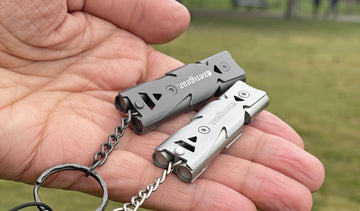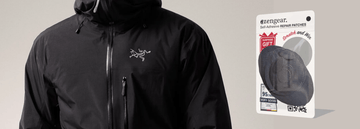The Lifesaving Sound: Emergency Whistles in Action
by Emily Jannet on Oct 23, 2023
When you think about essential tools for outdoor adventures or survival situations, emergency whistles might not be the first thing that comes to mind. However, these small, often overlooked devices can make the difference between life and death in critical situations. In this blog post, we'll explore the importance of emergency whistles, how they work, and why they should be an indispensable part of your outdoor gear.
The Basics of Emergency Whistles
Emergency whistles, as the name suggests, are devices designed to produce a loud and attention-grabbing sound in emergency situations. They are typically compact and lightweight, making them easy to carry with you on hikes, camping trips, or any outdoor activity where you might find yourself in need of help.
How They Work
Emergency whistles produce sound through a simple yet effective mechanism. When you blow air into the whistle, it passes over a small, built-in, high-pitched sound-producing element, typically a pea or a specially designed reed. This rapid movement of air over the sound-producing element creates a high-pitched, piercing sound that can carry over long distances.
Why Emergency Whistles Matter
Now that we understand the basics of how emergency whistles work, let's delve into the reasons why they are essential tools for outdoor enthusiasts and anyone who might find themselves in a potentially life-threatening situation.
Audibility
One of the primary reasons emergency whistles are so crucial is their audibility. The piercing sound produced by these whistles can be heard from great distances, even in adverse weather conditions. Unlike shouting for help, which can be easily drowned out by wind, rain, or other environmental noise, an emergency whistle's sound stands out.
Signal for Help
In an emergency, a whistle's high-pitched sound serves as a clear and universally recognized distress signal. Rescuers, whether they are search and rescue teams, fellow hikers, or emergency responders, know that this sound signifies someone in need of help. It cuts through confusion and ensures that your distress call is heard and understood.
Conservational Energy
In survival situations, conserving energy is paramount. Yelling for help can quickly deplete your energy and dehydrate you, especially in hot and arid conditions. By using an emergency whistle, you can send out a distress signal without expending significant energy, allowing you to stay focused on other critical survival tasks.
Increased Visibility
The sound produced by an emergency whistle not only alerts potential rescuers audibly but can also help them locate your position visually. When someone hears the whistle, they can often move toward the sound, helping pinpoint your exact location.
Versatility
Emergency whistles are incredibly versatile. They are not limited to outdoor adventures but can also be valuable in urban environments, during natural disasters, and in other emergency situations. Their compact size allows you to carry them in your pocket, backpack, or attached to your clothing.
Selecting the Right Emergency Whistle
Not all emergency whistles are created equal, and choosing the right one can make a significant difference in an emergency. Here are some factors to consider when selecting an emergency whistle:
- Loudness
Look for a whistle that produces a loud, piercing sound. The louder the whistle, the more likely it is to be heard from a distance.
- Durability
Opt for a durable, weather-resistant whistle. You never know what kind of conditions you might face in an emergency, so your whistle should be able to withstand rain, snow, and extreme temperatures.
- Ease of Use
Choose a whistle that is easy to use, even in high-stress situations. A whistle with a simple, one-piece design can be more reliable when you need it most.
- Attachment Options
Consider how you'll carry your whistle. Some come with built-in clips or lanyards for easy attachment to clothing, backpacks, or gear.
- Bright Color
A brightly colored whistle is easier to spot if dropped or misplaced. Choose a color that stands out against natural backgrounds.
What May Happen to You
To emphasize the importance of emergency whistles, let's look at a few real-life stories where these devices played a crucial role in saving lives.
The Hiker in Trouble
Imagine being lost in a dense forest, miles away from the nearest trailhead. With limited cell phone reception and no other means of communication, an emergency whistle becomes your lifeline. A fellow hiker, alerted by the sound of your whistle, can lead you back to safety or contact rescuers on your behalf.
Lost at Sea
For boaters and sailors, an emergency whistle can mean the difference between life and death. In the event of a capsized boat or a person overboard situation, an emergency whistle can help rescuers locate you amidst the vast expanse of the open sea.
Stranded in the Wilderness
Survival stories often feature individuals who find themselves stranded in remote wilderness areas. Whether due to an injury, equipment failure, or other unforeseen circumstances, these individuals have relied on their emergency whistles to call for help. The distinctive sound of a whistle carries farther and clearer than a human voice, significantly increasing the chances of being rescued.
Conclusion
Emergency whistles may seem like small, inconspicuous devices, but they are the unsung heroes of outdoor adventures and emergency situations. Their ability to produce a loud, attention-grabbing sound can make all the difference when time is of the essence. So, whether you're an avid hiker, camper, boater, or just someone concerned about preparedness, make sure to add an emergency whistle to your essential gear. It could be the lifeline you need when faced with a critical situation in the great outdoors or any unexpected emergency scenario.





